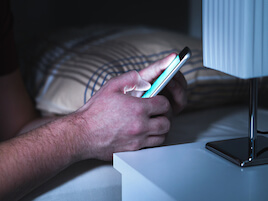
Many of us are ‘always on’.
We’re always reachable. Our smartphones rarely leave our person, ensuring that we can take a call away from the office. Grocery stores, doctors office, pee-wee hockey games—all can and have become impromptu workstations. Thanks to notifications that flash across laptop screens, buzz phones, and awaken smartwatches, we never miss emails either. Then there are the scores of other messaging apps, like Slack, WhatsApp, and Facebook, which oblige us to check multiple platforms multiple times a day for important communications. And for many of us, co-workers, clients, employees, or bosses are friends on social media, raising the possibility that a spare moment spent looking through a nephew’s baby pictures can turn into a quick business chat.
All this is exhausting. But the solution is clear: ban after-hours communications. Consider the following.
Workplace Stress Is Causing a Healthcare Crisis
A new book, Dying For a Paycheck, presents the cast that the biggest cause of chronic disease in the US is stress and the biggest cause of stress is poor workplace culture. There’s little reason to think that Canada is any different. Psychiatrists say that at least 40% of Canadians suffer from workplace stress and stress is the reason that one in four Canadians quit their job. A big part of that stress is long hours.
There Are Scientifically Proven Benefits to Disconnecting
Scientists at Kansas State University have found that people who unplugged after work were more refreshed and more productive the next day. A study from the University of Gothenburg found that high mobile phone usage correlates with stress, disturbed sleep, and depression. Doctors say that burnout, or severe chronic stress, is a debilitating condition that may be increasing; one of the main ways to combat it is to reclaim downtime. Speaking of downtime, it’s one of the best ways to boost productivity. And there’s plenty of research that says taking time off is the secret to increased productivity.
There Are Technological Solutions
Volkswagen stops routing emails 30 minutes after an employee’s shift. They resume routing emails 30 minutes prior to the start of an employee’s shift. Daimler and Porsche have done similar things. This won’t work for every company, but it’s an idea.
Countries & Cities Are Already Doing It
If you’re a business in France of more than 50 people, you must ban employees from sending or receiving emails after hours. New York City is considering doing the same for businesses with more than 10 people. A similar “right-to-disconnect” bill is being tabled in Quebec, and there’s chatter about other Canadian polities following suit.
The Bottom Line
Modern office work has changed significantly from the days where everyone sat in a cubical from nine to five. People work from home, have to travel between multiple jobsites, need to connect to remote employees, use coworking spaces, and more. There have been tremendous benefits to these changes, but the lines between work and leisure have become unnecessarily blurred. It’s important for companies to help re-establish these boundaries, for the sake of their employee’s health and productivity.

